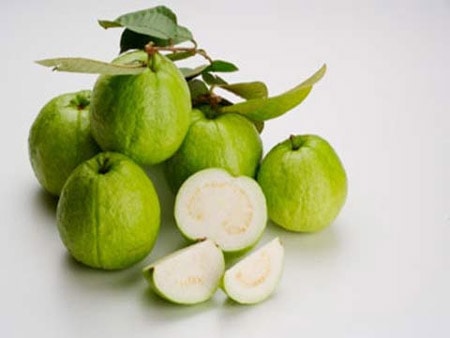Guava - Delicious and aids digestion!
Guava is one of the nutritious fruits, good for health, providing a large amount of vitamin A, C, beta-carotene... for our body.

Unknown facts about guava
Guava is a popular fruit in our country with the scientific name Psidium Guajava. The aroma of guava is pleasant, especially when the guava is ripe. Associate Professor, Dr. Tran Dinh Toan, Head of the Department of Nutrition at Friendship Hospital, said: "Guava contains little saturated fat, cholesterol and sodium but contains a lot of dietary fiber, vitamins C, A, zinc, potassium and manganese".
According to Oriental medicine, guava is very good for supporting the digestive system. Green guava contains many astringent agents, which help support weak intestines when suffering from diarrhea. They are naturally alkaline and have antibacterial and disinfectant properties, so they can also treat dysentery by inhibiting the growth of microorganisms and eliminating unnecessary mucus in the intestines.
“Ripe guava has the effect of nourishing, strengthening the spleen, aiding digestion, often used in cases of constipation, indigestion, bleeding, diabetes”, Associate Professor, Dr. Tran Dinh Toan added and emphasized: “The nutrients in guava such as vitamin C, carotenoids have the effect of nourishing the digestive system”. Guava also functions to support the intestines and stomach in case these parts are inflamed. Guava is also rich in fiber, guava seeds also “serve” the digestive system as a laxative, so eating guava will help the intestines retain water, clean the digestive system and excretions.
This fruit also helps reduce cholesterol in the blood, prevents the blood from thickening, thus increasing blood mobility, helping blood circulate more easily in the body. Fresh guava, containing high amounts of soluble fiber (pectin) and insoluble fiber can help lower blood sugar safely, preventing high blood pressure.
Guava helps lower cholesterol, protect the heart and strengthen the body's immune system thanks to its rich nutrients and minerals.
For people with physical weakness, guava can provide a large amount of vitamins and trace elements, helping the body recover quickly and increase resistance to external toxins.
Note when eating guava
The amount of vitamin C in guava is mainly concentrated near the peel. Therefore, you should wash the guava thoroughly and eat the peel to be able to take full advantage of the amount of vitamins in the guava. "These vitamins also have anti-oxidant and anti-aging effects and make blood vessel walls more stable, beneficial for the cardiovascular system, preventing dyslipidemia", Associate Professor, Dr. Tran Dinh Toan emphasized.
Although guava is not poisonous, you should not eat unripe guava because it still has a lot of astringent taste which will be harmful to those with stomach problems or constipation.
When eating ripe guava, you should also remove the guava seeds because guava seeds are difficult to digest, causing digestive problems.
People with physical weakness should use guava in pureed or juiced form for better absorption./.
According to suckhoevadoisong.net - NT






